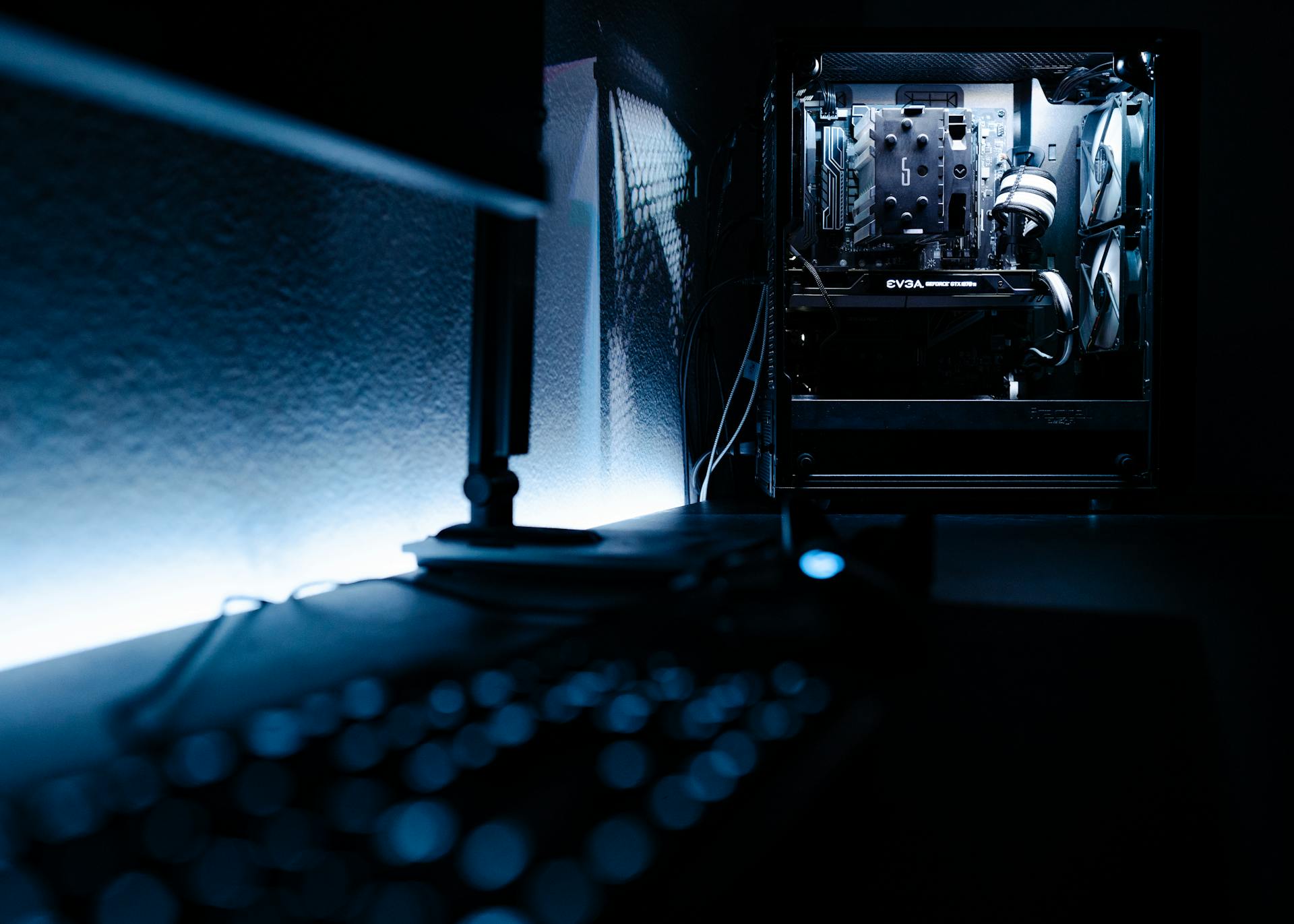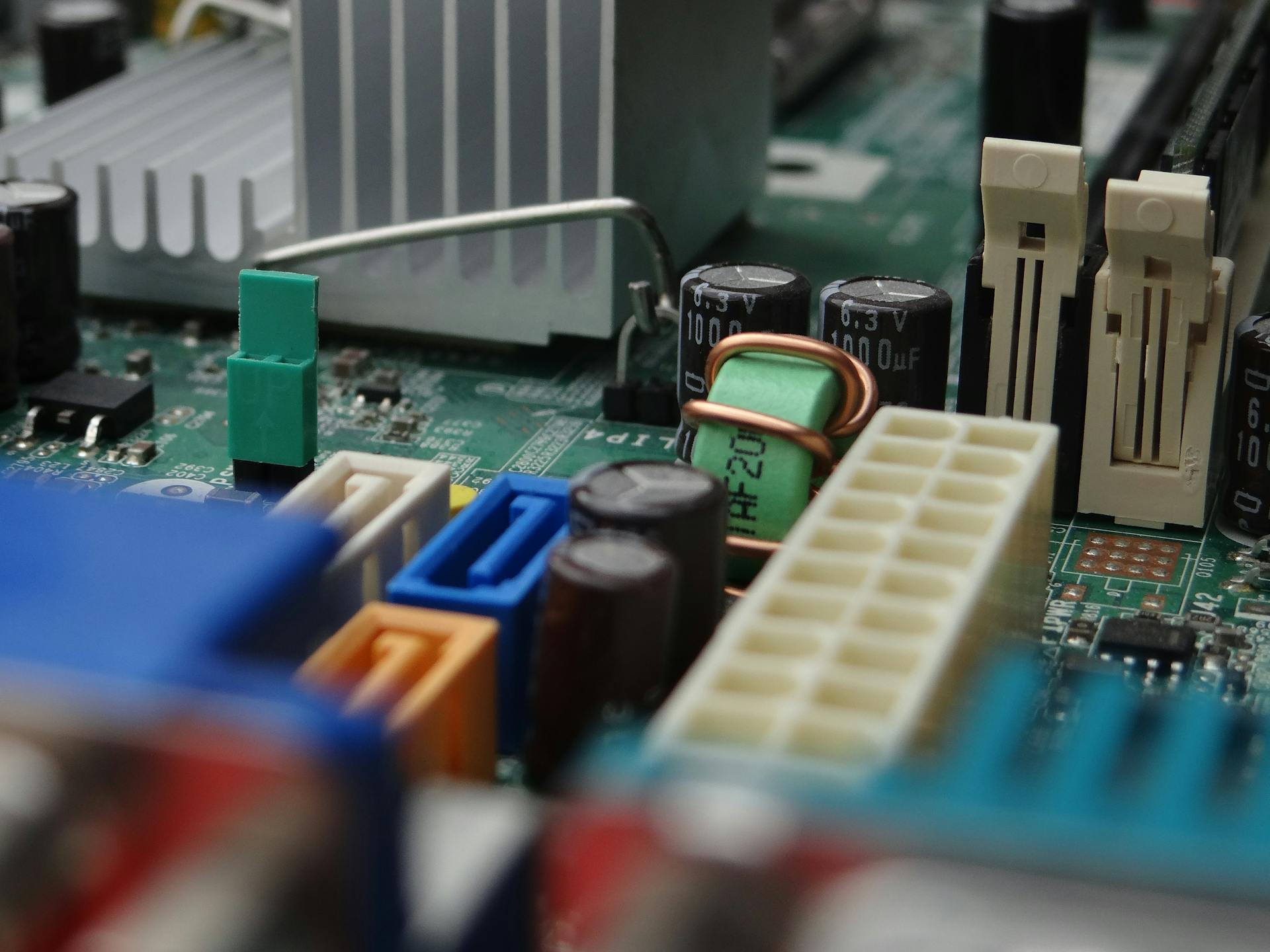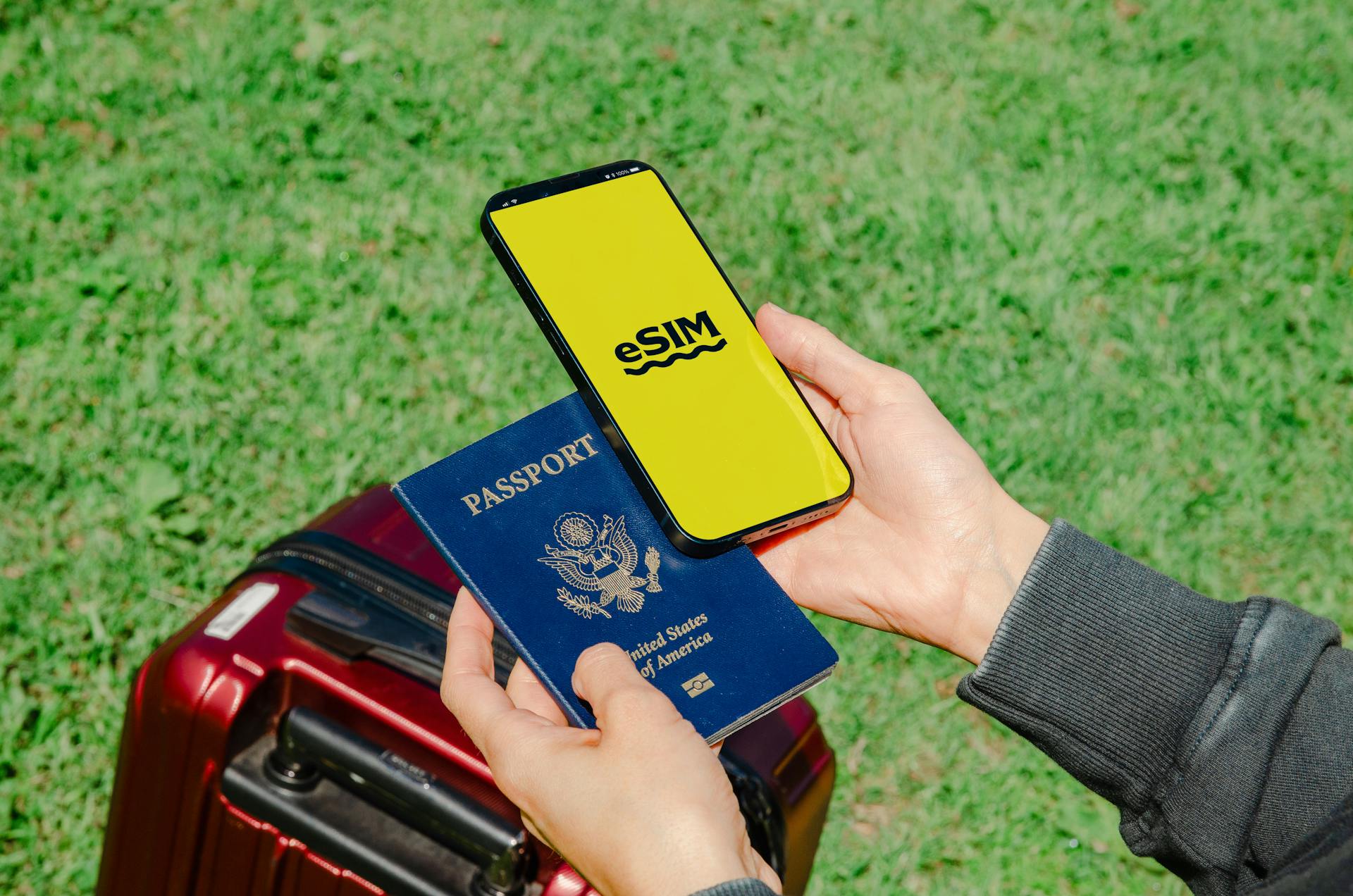
Electronic NICS checks are a crucial step in the firearms purchasing process, but did you know that the process is governed by federal law? The National Instant Background Check System (NICS) is a database that contains information on prohibited persons, including felons and domestic violence offenders.
The NICS database is maintained by the FBI and contains over 20 million records. This database is used to check the background of individuals before they can purchase a firearm.
To perform an electronic NICS check, a licensed firearms dealer must submit the buyer's identifying information to the NICS database. This information is then checked against the database to determine if the buyer is prohibited from possessing a firearm.
The entire process typically takes a few seconds to a few minutes, but can be delayed if the database is experiencing technical issues.
Suggestion: Personal Background Checks
National Instant Criminal Background Check
The National Instant Criminal Background Check System, or NICS, is a crucial part of the electronic NICS check process. Established at the FBI in 1998, it's a system designed to instantly check whether a person is eligible to purchase a firearm.
The NICS system requires FFL dealers to run background checks on their buyers, which includes searching for information such as convictions, fugitive status, and mental health records. The system is administered by the FBI and has been operational since 1998.
FFL dealers can participate in the NICS system by enrolling and using the NICS E-Check system, which allows for electronic processing of background checks. This can take just under two minutes, making it a fast and efficient way to conduct background checks.
To initiate a background check, FFL dealers need to have all necessary information ready, including completed Form 4473, a valid photo ID, and answers to certain questions. If the dealer is using the NICS E-Check system, they'll need to answer questions about the buyer's eligibility, such as whether they've been convicted of a crime or are a fugitive from justice.
Here are some of the reasons why a background check might be denied:
- Convicted of a crime punishable by more than one year or a misdemeanor punishable by more than two years
- Fugitive from justice
- Misdemeanor Crime of Domestic Violence Conviction
- Unlawful User/Addicted to a Controlled Substance
By using the NICS system, FFL dealers can ensure they're complying with federal and state laws, and that they're providing a safe and responsible way for people to purchase firearms.
NICS Background Check Process
The NICS Background Check Process is designed to be efficient, with most checks taking just under two minutes to complete. Electronic processing is the fastest way to initiate a background check, and it requires a separate enrollment, which can be completed online.
To initiate a background check, you'll need to have all the necessary information ready, including Sections A & B of the new 2020 Form 4473 fully completed, a valid photo ID for each background check, and answers to specific questions, such as whether the transferee has been convicted of a crime punishable by imprisonment for a term exceeding one year.
The background check process involves accessing three databases: the National Crime Information Center (NCIC), the Interstate Identification Index (III), and the NICS Index. If there's no match in any of the databases, the dealer is cleared to proceed with the transfer. Otherwise, the FBI's NICS Section must contact the appropriate judicial and/or law enforcement agencies for more information.
Here's a list of the information you'll need to have ready for a background check:
- Sections A & B of the new 2020 Form 4473 fully completed
- A valid photo ID for each background check
- Answers to questions 21a-21k, and 21.1.1 and 21.1.2 (unless the transferee is using a Visa, in the US temporarily, possess a valid hunting license or other qualifying exemption document)
Note that the speed of the background check depends on which contact method you're using, with call centers taking about two minutes on average and electronic processing taking just under two minutes.
Background
Background checks for firearm buyers have been discussed as early as the 1930s. The Gun Control Act of 1968 mandated that individual and corporate firearms dealers hold a Federal Firearms License (FFL).
The Gun Control Act of 1968 also created a system for keeping prohibited persons from buying guns, but sellers were not required to verify the answers to the "yes/no" questions they were asked. This system relied on buyers answering questions such as, "Are you a fugitive from justice?".
Background checks became a coordinated effort after the assassination attempt on President Ronald Reagan in March 1981. White House press secretary James Brady was seriously wounded in the attack, and his wife, Sarah Brady, spearheaded the push to pass the Brady Handgun Violence Prevention Act in 1993.
The Brady Act mandated that FFL dealers run background checks on their buyers, starting with handgun sales and a five-day waiting period. The law applied only to handgun sales and had a maximum waiting period of five days.
By 1998, the NICS was up and running, administered by the FBI, and applied to all firearms purchases from FFL dealers, including long guns.
Functionality
The National Instant Criminal Background Check System (NICS) is a complex process, but it's essential to understand how it works. The NICS system is established at the FBI and is used to determine whether a person is eligible to purchase a firearm.
A prospective buyer from a Federal Firearms License (FFL) dealer must complete and sign an ATF Form 4473, also known as the Firearms Transaction Record. The FFL dealer then contacts the NICS by telephone or Internet to initiate the background check.
Three databases are accessed during the background check: the National Crime Information Center (NCIC), the Interstate Identification Index (III), and the NICS Index. This process usually takes just a few minutes, and if there's no match in any of the databases, the dealer is cleared to proceed with the transfer.
If there is a match, the FBI's NICS Section must contact the relevant judicial and/or law enforcement agencies for more information. The FBI has three business days to make its decision to approve or deny the transfer, but if the FFL dealer hasn't received a decision within that time, they can legally proceed with the transaction.
In 2019, a significant number of background checks took longer than three business days, with 261,312 federal background checks taking longer than the required time. Of those, 2,989 were referred to the ATF for retrieval.
Explore further: Business Checks vs Personal Checks
Record Management
Record Management is crucial in electronic NICs check systems. Accurate and up-to-date records ensure seamless transactions and prevent errors.
Digital records can be easily accessed and shared, reducing the risk of lost or misplaced documents. This is particularly important in high-volume transactions, where speed and efficiency are essential.
In electronic NICs check systems, records can be automatically updated and synced across all relevant platforms, eliminating the need for manual updates and reducing the risk of discrepancies.
Validation and Integrity of Records
Maintaining the integrity of records is crucial in any record management system. The FBI is responsible for ensuring data integrity during NICS operations, which includes ensuring accurate adding, canceling, or modifying of NICS Index records supplied by Federal agencies.
Automated systems are in place to reject any attempted entry of records containing invalid data elements. This helps prevent errors and inaccuracies from entering the system in the first place.
Data sources are also responsible for ensuring the accuracy and validity of the data they provide to the NICS Index. This includes immediately correcting any record determined to be invalid or incorrect.
Quality control checks are conducted through periodic internal audits by FBI personnel to verify the validity and accuracy of the information provided to the NICS Index. This helps ensure that the records remain accurate and up-to-date.
Records in the NICS Index are automatically purged after a prescribed period of time. This helps maintain the system's efficiency and prevents unnecessary clutter.
Accessing Records

Accessing Records is a crucial part of record management.
Electronic records can be accessed quickly and easily through a computer or mobile device, but they require a reliable internet connection and the necessary software or apps to view them.
The physical storage of paper records can be a challenge, but they can be easily accessed by searching through files and folders.
A well-organized filing system can help you quickly locate the records you need, and a designated record keeper can ensure that records are stored and retrieved properly.
Digital storage solutions like cloud storage and external hard drives can provide a secure and convenient way to store and access electronic records.
In some cases, records may be stored off-site, which can require additional time and effort to access them, but this can be a good option for storing large volumes of records.
Section 25.7 Query Records
Querying records in the system can be done using a unique numeric identifier, such as a Social Security number or military number.
You might enjoy: Citizens Credit Card Phone Number

This identifier can be used to search for records based on exact matches, making it a quick and efficient way to find the information you need.
You can also include additional identifiers like height, weight, eye and hair color, and place of birth in your query, at the option of the querying agency.
These additional identifiers can be included in the initial query or requested after an initial query, depending on the agency's discretion.
If you're denied a background check, you can request the reason from the denying agency, which will be either the FBI or the state or local law enforcement agency serving as a POC.
To do this, you'll need to provide the name and address of the denying agency and the unique transaction number (NTN or STN) associated with the NICS background check.
You can make this request in writing to the denying agency, although POCs may waive this requirement at their discretion.
Section 25.8 Safeguards
To maintain the integrity of your record management system, it's essential to have safeguards in place.
Implementing access controls can prevent unauthorized access to sensitive information.
Regular backups of your records can ensure business continuity in case of data loss or system failure.
The article's section on "Data Classification" emphasizes the importance of labeling records as confidential, public, or internal.
Automating record retention and disposal processes can reduce the risk of human error.
A clear audit trail can provide a transparent record of all changes made to your records.
Retention and Destruction of Records
Records should be stored in a secure location to prevent unauthorized access. This is especially true for sensitive information such as financial records.
The National Archives and Records Administration (NARA) recommends storing records in a climate-controlled environment to prevent damage from temperature and humidity fluctuations.
Records should be stored in a way that makes them easily accessible. This includes using a consistent filing system and labeling files clearly.
Electronic records should be stored on a secure server or cloud storage service to prevent data loss.
Prohibited Activities and Penalties
Violating the rules of the NICS system can result in a fine not to exceed $10,000 and cancellation of NICS inquiry privileges.
State or local agencies, FFLs, or individuals who misuse or access the system unauthorized can face severe penalties.
Purposefully furnishing incorrect information to the system to obtain a "Proceed" response can lead to a fine and cancellation of privileges.
Using the system for unauthorized purposes, such as performing a check for reasons other than a firearm transfer, is also prohibited.
Any unauthorized person accessing the NICS can lead to serious consequences.
Here are some examples of prohibited activities:
- Furnishing incorrect information to obtain a "Proceed" response.
- Using the system for unauthorized purposes.
- Unauthorized access to the NICS.
Firearm Eligibility Checks
Firearm Eligibility Checks are a crucial part of the electronic NICS check process. The NICS system searches multiple databases to determine if a person is eligible to purchase firearms.
The NICS Index is used to determine eligibility, and it's maintained by the FBI. It includes information on people who have been adjudicated as mentally defective or committed to a mental institution.
A fresh viewpoint: Check Masshealth Eligibility
A background check can take as little as two minutes, depending on the contact method used. Electronic processing is the fastest option, with an average time of just under two minutes.
To pass a background check, you'll need to answer "yes" to question 21a and "no" to questions 21b-21k, and 21.1.1 and 21.1.2 (unless you have a qualifying exemption). You'll also need to provide a valid photo ID and complete sections A & B of the 2020 Form 4473.
The following information is required for a background check: a valid photo ID, sections A & B of the 2020 Form 4473, and answers to questions 21a-21k and 21.1.1-21.1.2.
Here are the types of information that can disqualify you from purchasing firearms:
- Convicted in any court of a crime punishable by imprisonment for a term exceeding one year;
- Fugitive from justice;
- Unlawful user of or addicted to any controlled substance;
- Adjudicated as a mental defective or committed to a mental institution;
- Illegal alien;
- Discharged from the Armed Forces under dishonorable conditions;
- Renounced United States citizenship;
- Subject to a court order restraining the person from harassing, stalking, or threatening an intimate partner or child;
- Convicted of a misdemeanor crime of domestic violence.
NICS Background Check Databases
The National Instant Criminal Background Check System (NICS) relies on a vast network of databases to perform background checks. The NICS checks more than 60 databases or "indexes" as part of its process.
The NCIC, a database of stolen property, missing persons, and domestic violence protection orders, is one of the primary databases searched during a NICS background check. The NCIC is a powerful tool for law enforcement agencies to access and share information.
The Interstate Identification Index (III) is a national index of criminal histories maintained by the FBI. It allows states to share information on criminal activity between themselves.
The NICS Index is used to determine whether or not a person is eligible to purchase firearms or explosives. This index is a crucial component of the NICS process.
The Department of Homeland Security’s Immigration and Customs Enforcement database is used when the prospective buyer isn’t a U.S. citizen. This database helps ensure that only eligible individuals can purchase firearms or explosives.
Appeals and Errors
If you're denied a firearm purchase due to a NICS background check, you can appeal the decision by challenging the accuracy of the record used in the evaluation or claiming that the record is invalid or doesn't pertain to you.
According to the National Rifle Association, false positives in the NICS system can deny citizens' Second Amendment rights, with some people not even bothering to appeal erroneous denials.
The FBI's 2014 operations report found that of 90,895 "deny transactions", 4,411 (about 5%) were overturned after further research by the NICS section.
In many cases, deny decisions are overturned because the individual's fingerprints don't match the fingerprints of the subject of the firearms-disqualifying record.
The NICS system also includes a "Voluntary Appeal File" procedure, which allows an individual to request that their identifying information be retained rather than purged, to prevent future erroneous denials or delays.
Correcting Errors
A correctable error is one that can be rectified by the court or a higher authority, whereas an incurable error is one that cannot be corrected.
In some cases, errors can be corrected through the appeals process, as seen in the case of Smith v. Johnson, where a clerical mistake was identified and corrected during the appeal.

Correcting errors can be a lengthy process, taking several months to a year or more to resolve.
A review of the record is often necessary to identify the source of the error and determine the best course of action for correction.
In the case of Brown v. State, the court corrected a sentencing error after discovering it was based on an incorrect calculation.
Correcting errors requires a thorough understanding of the relevant laws and procedures to ensure the correction is valid and effective.
In the case of Davis v. City, a correction to a witness statement was made after it was determined to be inaccurate.
The correction process can be complex and may involve multiple parties, including the court, the parties involved, and other stakeholders.
Responses
The NICS transaction number (NTN) is recorded in field 27b if the response to a background check is "proceed". If the response is "denied", a NICS resolution card with NTN at the bottom is provided to the customer so they can appeal.

A "delayed" response means the NICS has three days to research and respond. If there is no response after three days, the transfer of the firearm can proceed.
2,139,545 firearm transfers have been denied from November 30, 1998, to September 30, 2022. This is a small fraction of the number of background checks conducted.
51% of denied firearm transfers were due to the conviction of a crime. 10% were because the person was a fugitive from justice, and another 10% were due to the unlawful use of a controlled substance.
Firearm Denial Appeals
If you've been denied a firearm purchase due to a NICS denial, you can appeal the decision. According to the National Rifle Association, false positives in the NICS system can deny citizens' Second Amendment rights.
The provisions for appeals are outlined in the NICS Regulations at Title 28, Code of Federal Regulations, Part 25.10, and Subsection 103 (f) and (g) and Section 104 of the Brady Handgun Violence Prevention Act of 1993. You can challenge the accuracy of the record used in the evaluation of the denial or claim that the record used as basis for the denial is invalid or does not pertain to you.
In 2014, the FBI's NICS section overturned 4,411 (about 5%) of 90,895 "deny transactions" after further research. The primary reason for overturned deny decisions was the appellant's fingerprints not matching the fingerprints of the subject of the firearms-disqualifying record.
The NICS system also includes a "Voluntary Appeal File" procedure, by which an individual may request that the NICS section retain their identifying information to prevent future erroneous denials or delays. This can save you time and hassle in the long run.
In January 2016, the FBI stopped processing NICS denial appeals, leaving a backlog of approximately 7,100 appeals. The National Rifle Association called this a "gross disregard for those illegitimately denied their Second Amendment rights."
Core Claims of Failures
The Charleston Church shooting highlighted a critical failure in the FBI's background-check system. An error in the system allowed Dylann Roof to purchase a gun, despite being a prohibited person due to possessing Suboxone without a prescription.
The FBI's internal report on Roof's background check revealed gaps in the agency's databases and policies for handling background checks. This led to the Fourth Circuit Court of Appeals ruling that the survivors and families of the deceased can sue the federal government.
The Sutherland Springs church shooting was another devastating example of a failure in the system. Devin Patrick Kelley, a prohibited person due to a domestic violence conviction, was able to purchase a gun because the Air Force failed to record his conviction in the FBI's National Crime Information Center database.
The Air Force had issued reports flagging similar problems with criminal reporting in 1997 and 2015, but the error in Kelley's case still occurred. This led to the Air Force beginning a review of its practices.
These failures highlight the importance of accurate and timely reporting in the background-check system.
Frequently Asked Questions
What does NICS e-check mean?
NICS e-check refers to the electronic background check process used to verify an individual's eligibility to purchase a firearm in the United States. This system is a rapid, secure way to check for any disqualifying factors in a person's background.
What fails a NICS background check?
A felony conviction or a misdemeanor domestic violence conviction will fail a NICS background check, potentially preventing you from owning a gun. Learn more about the specific types of convictions that disqualify you from gun ownership.
Sources
- https://www.ecfr.gov/current/title-28/chapter-I/part-25/subpart-A
- https://www.ecfr.gov/current/title-28/chapter-I/part-25/subpart-A/section-25.6
- https://en.wikipedia.org/wiki/National_Instant_Criminal_Background_Check_System
- https://www.bravostoresystems.com/post/everything-you-need-to-know-about-nics-background-checks
- https://www.fastbound.com/ffl-bound-book-software-features/multi-state-background-check/
Featured Images: pexels.com


